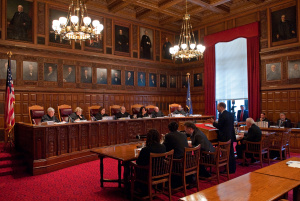Jon Corzine pays regulators $5 million for his part in monumental collapse of MF Global
Following 5 years of investigations by litigators, law enforcement agencies and regulatory authorities, former CEO of failed electronic trading firm MF Global, Jon Corzine, has settled with the CFTC for $5 million, and accepted a ban on trading client money or other assets under the CFTC’s jurisdiction

Just over five years have passed since MF Global, one of the most notorious electronic trading companies in the world, collapsed, the firm’s stock price having declined two-thirds in the final week of October 2011 and its credit rating having reduced resulting in its liabilities becoming high-yield debt following huge quarterly losses.
Former politician Jon Corzine had been elected CEO and Chairman just one year before, in March 2010, and was responsible for the leadership of the publicly listed futures broker and bond dealer at its time of collapse, resulting in a massive public outcry, its demise having been one of the factors which prompted the US government to press forward with the infrastructural changes and large capital adequacy requirements that were proposed in the Dodd-Frank Wall Street Reform Act, in order to protect retail traders from losses of assets should a company fail.
Today, Mr Corzine, following substantial legal wrangling that has taken place over the last five years, has settled with the Commodity Futures Trading Commission (CFTC) for his part in the demise of the firm, agreeing to pay $5 million with the CFTC also banning him from trading client money in commodities or other assets which fall under the regulatory remit of the CFTC.
On October 31, 2011, trading was halted on shares of MF Global prior to the market opening, and soon thereafter MF Global announced that it had declared Chapter 11 bankruptcy. Shortly afterwards, federal regulators began an investigation into hundreds of millions of dollars in missing customer funds.
Mr. Corzine, who has a flamboyant career history including a period as Governor of New Jersey as well as a senior executive position at Goldman Sachs, resigned as CEO of MF Global on November 4, 2011, after having retained the services of defense attorney Andrew J. Levander.
It was reported that Mr Corzine declined a severance package worth $12.1 million. MF Global’s collapse was one of the ten biggest bankruptcies in U.S. history.
Corzine was subpoenaed to appear before a House committee on December 8, 2011, to answer questions regarding 1.2 billion dollars of missing money from MF Global client accounts. He testified before the committee, “I simply do not know where the money is, or why the accounts have not been reconciled to date”, and that given the number of money transfers in the final days of trading at MF Global, he didn’t know specifics of the movement of the funds.
He also denied authorizing any misuse of customer funds. In March 2012, Bloomberg reported on a memo produced by congressional investigators that quoted an internal company e-mail relating to a $175 million transfer which was a subject of their investigation. Initial media reports suggested impropriety on Mr. Corzine’s part, but this was later disproved.
According to the New York Times, the employee responsible for the transfer e-mailed Mr. Corzine stating the transfer was a “House Wire”, meaning it came from the firm’s own account.
The instructions Mr. Corzine had given were to deal with several overdrafts at JPMorgan Chase, but never related to any specific accounts or specific transfers made. A spokesperson for Mr. Corzine responded that Corzine “never directed Ms. O’Brien or anyone else regarding which account should be used to cure the overdrafts, and he never directed that customer funds should be used for that purpose. Nor was he informed that customer funds had been used for that purpose.”
In fact, as the New York Times reported, Mr. Corzine had been given specific assurances that the transfer in question was proper, and that no customer funds had been used. Subsequent court filings also attest to this fact. On November 5, 2013 The New York Times reported that MF Global customers would likely recover 100 percent of their funds.
A spokesman for Mr. Corzine said “Mr. Corzine is very pleased that all customers will receive a full recovery. This is a great outcome, which has been anticipated for many months.” Customers have since received distributions making them whole.
In a statement today, Mr. Corzine said he accepted responsibility for the company’s failure and is pleased to have reached a settlement.
Criminal prosecutors had previously investigated the roles Mr. Corzine and other executives played in the shortfalls, but brought no charges. A federal judge approved a $132 million settlement between former MF Global executives, including Mr. Corzine, and the firm’s customers last year, resolving most of the legal headaches stemming from MF Global. The CFTC case was the only unresolved investigation.
The CFTC sued Mr. Corzine and a top lieutenant in 2013 in a civil case and accused them of overseeing the misuse of customer funds, and with today’s settlement agreement, the entire MF Global saga has finally drawn to a close.









